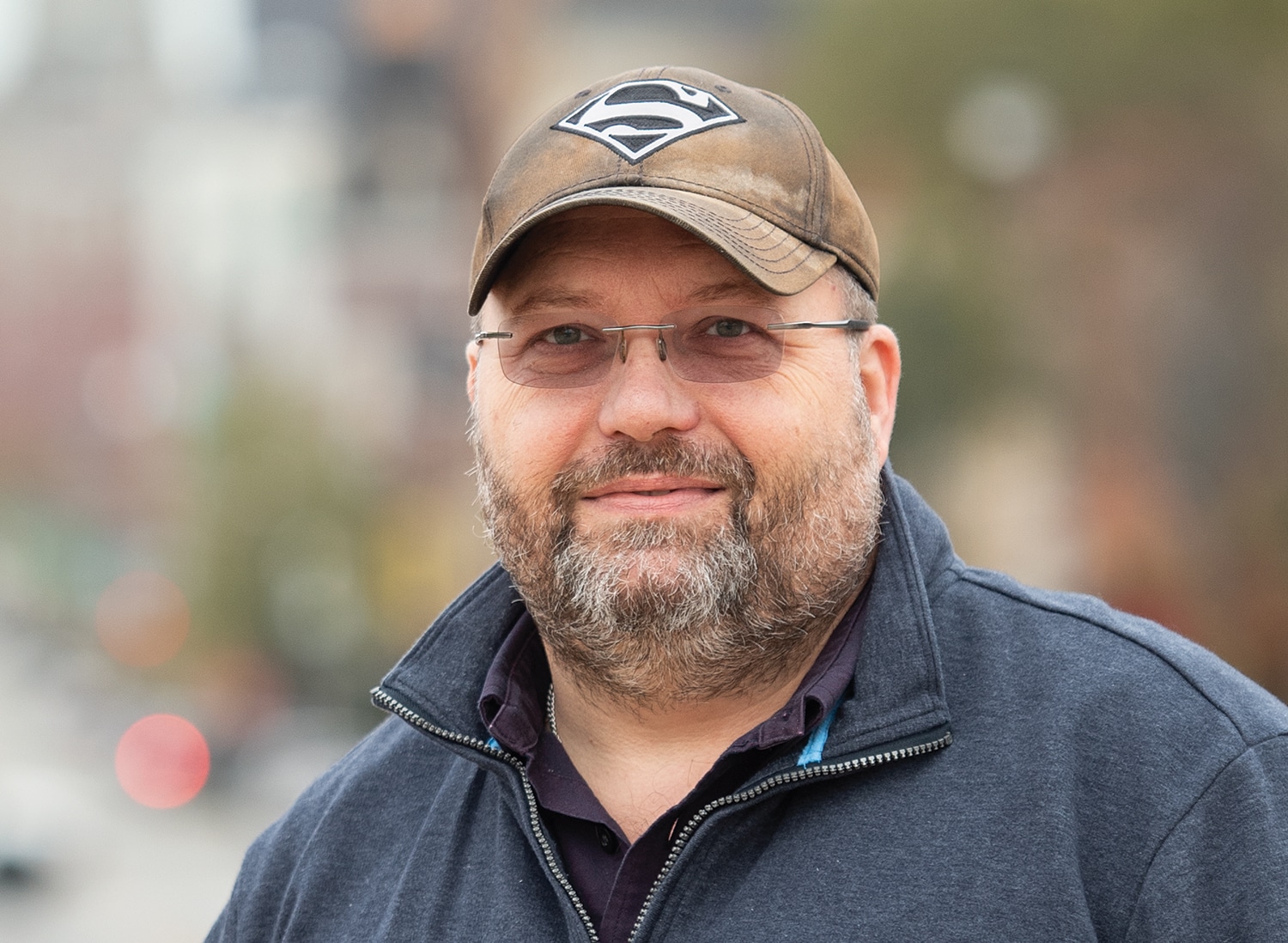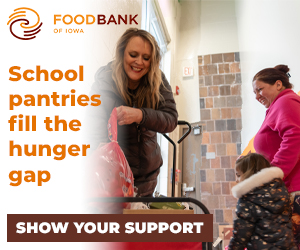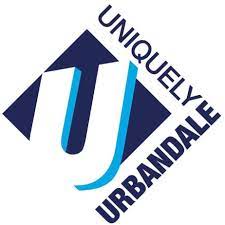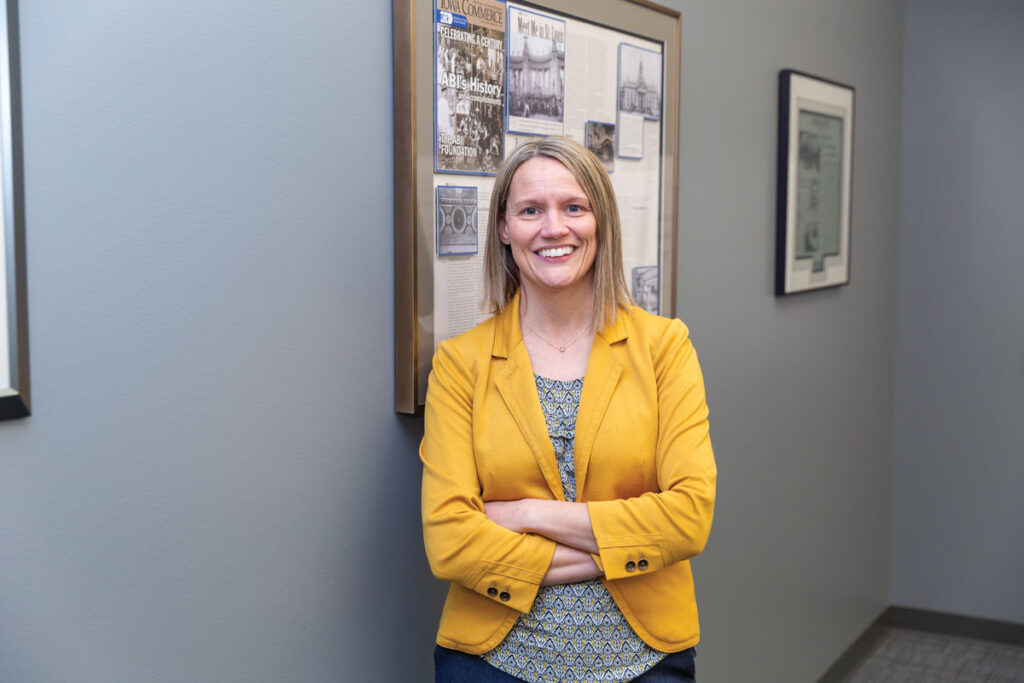A Closer Look: Jimmy Olsen
Downtown Chamber executive director, radio personality
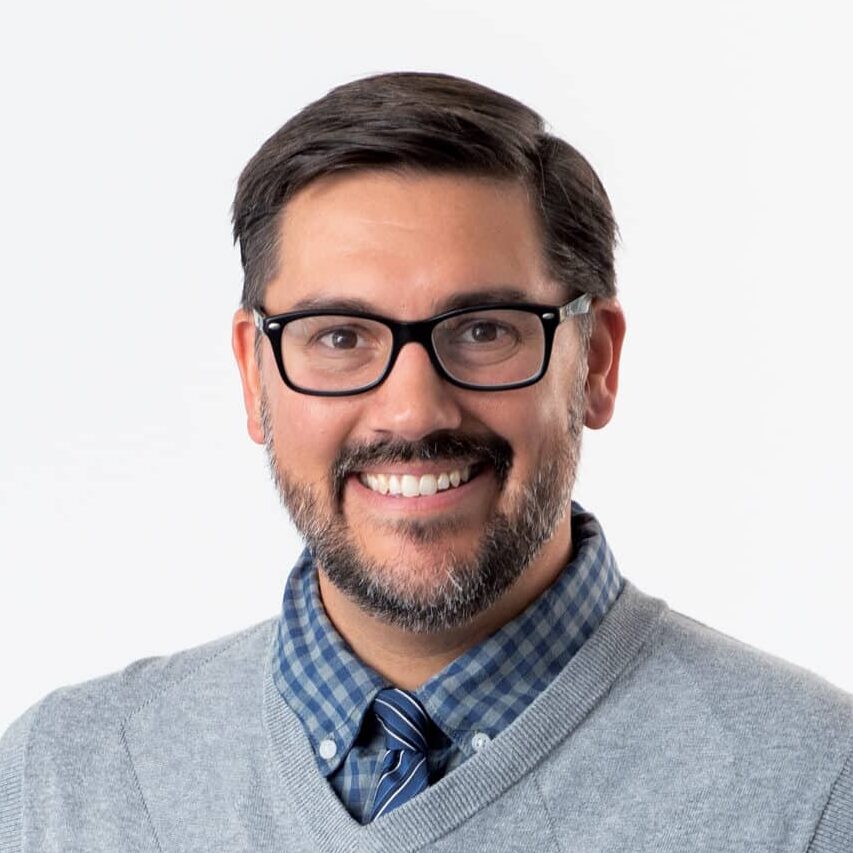
For decades, Jimmy Olsen has claimed the moniker “The most recognized name in Central Iowa.”
The 30-plus-year radio personality, event emcee and small business owner began playing into the name he shares with the fictional photojournalist from the DC “Superman” comics in the mid-2000s when he first established a social media presence.
When Olsen took over the role of executive director for the Des Moines Downtown Chamber of Commerce on July 24, the slogan stuck.
He is best known as a Des Moines radio voice on FM stations including More 104.1, 93.3 KIOA and Star 102.5. Olsen said he’s been active in Des Moines-area chamber networks for more than a decade to generate clients for his emceeing and event business.
“The radio business is a hustle,” Olsen said. “At one point, I had five jobs.”
For the Des Moines native, downtown is nostalgic. As a child, he’d take the bus downtown to “wander the skywalks,” and meet his mother, who worked downtown, at a cafe for coffee where Olsen said he saw Iowa radio broadcasters like former Iowa Hawkeye play-by-play announcer Jim Zabel and former WHO radio and TV sportscaster Tony A. Powers.
This will also be Olsen’s sixth year emceeing the downtown Christkindlmarket Des Moines, he said.
Olsen has been executive director for four months, succeeding Staci Bennett, who served in the role from February 2021 to April 2023. Joe Benesh, the chamber board’s secretary who first recruited Olsen to be a board member, served a short stint as interim director after Bennett departed.
According to Olsen, the downtown chamber is working toward reestablishing its membership forums to help business owners and operators reconnect after a difficult COVID-19 pandemic period and work together to solve common problems.
Olsen said the chamber hopes to create more cooperation between event planners and local business, strengthen entrepreneurship and increase foot traffic from downtown’s continued residential demand.
The chamber recently leased a new office space on the 23rd floor of the Financial Center on Walnut Street, and Olsen said he’s been charged by the chamber’s board of directors to relaunch its podcast.
Olsen recently sat down with the Business Record at Caribou Coffee on Ingersoll Avenue – his morning “mobile office” spot – to talk about the downtown chamber’s priorities and strategy for 2024 and beyond. Lying on the coffee table in front of Olsen’s seat were a pile of scoured-through newspapers and a tan ball cap with the “Superman” insignia.
This Q&A has been lightly edited and condensed for clarity and length.
What should Business Record readers know about Jimmy Olsen, the professional beyond your radio persona?
What’s a professional? What’s a person? I really don’t know who I am. Dude, I just do my thing. The transition from radio for over 30 years to a downtown chamber director, some people look at that and go, “How does that work?” … This will be the first time that I’ve not been on the air, especially in Des Moines, in over 20 years, at least not officially. … I don’t even have a part-time job in radio. There is not even an option at this point of me being on the air. It’s the end of an era. … But moving into this, I really didn’t know. I’ll be honest. … How does [radio] transcribe into a different world? I wasn’t 100% sure. I had a lot of conversations, a lot of things that I already knew, which made sense rolling over [from radio]. In a lot of ways, it’s [the chamber executive director] kind of a PR thing. A lot [of what] I do, it’s very old-school radio, when you actually went out in public and met people who did things. The only difference is I’m not on the air. But I’m doing the exact same job as what I used to do between the events, talking to you, meeting with people every day and just dealing with memberships.
In what other ways did a career in marketing and radio prepare you to lead the Downtown chamber?
It prepared me very well. It gave me a lot of insight for many things. That’s the big thing with the chamber, supporting businesses to help them, to give them exposure, to get the word out about them. … coming out of the pandemic, to revitalize downtown. I know downtown really got hit hard compared to most areas just because everybody was doing work from home. Some are coming back. Some are not coming back. Some businesses will end up leaving downtown just because their workforce has gotten smaller, so they need to fill other buildings that they have in areas.
Since you started the job in July, what’s been the biggest challenge you’ve determined is facing downtown Des Mones and downtown businesses?
I’m still trying to get it figured out. I’m having conversations with a lot of the businesses down there. … I think a lot of it is just trying to get people back downtown again. I know people are ready to get out and do things. There’s a lot of things that were happening downtown that are not happening downtown anymore. Part of that is trying to figure out how to bring those things back. Not just the once-a-weekend things – when you have the 80/35 [Music Festival], when you have the [Des Moines] Arts Festival, when you have Latino [Heritage] Festival – all those things that happened downtown just for the weekend. But what happens on a regular basis? But then again, things are changing. It’s just trying to figure out how to get people involved – those that will be coming back downtown, and a lot of the smaller businesses that we’re getting downtown that we really didn’t have before, more of the entrepreneurial type of businesses that downtown didn’t really have way back when and now we do. [Whether] it’s a tech company or whatever it is. It’s just trying to get those in. You’ve got a lot of people who live downtown … how can we figure out a way to invite them into the businesses … hospitality businesses? … How do we just create that synergy between the residential and the commercial and bring everybody together downtown?
What is the greatest need for downtown’s small business owners?
It depends on the industry you’re in. When it comes to hospitality, the biggest need is just getting people in their front door. Through conversations that I’ve had, there are lots of obstacles. It’s not just people not coming downtown. … It’s other things that are not working to their advantage. When you’re having a special event … road closures or whatever, it is people not working together. … How do you figure out, which it’s not easy, how to get those events to work with businesses that are downtown? … People are still having issues, especially the hospitality [industry], getting workers and things like that. Especially with events coming downtown … shutting down the streets, which then kind of hurts the businesses that are on those streets. … Now all of a sudden, they’re [events] bringing in food and drinks because they’re trying to make money off that. And you have a restaurant right there, so it becomes a competition for them for the weekend [during] the time that they’re open. But then [some] make a comment, ‘Well, if they want to be involved, come out to the street.’ … There are other hoops that restaurants would have to jump through for the state and city to do that, which would also cost more money. This isn’t an easy balance. So how do you figure that out?
How would you assess the state of downtown chamber members at this point in the COVID-19 pandemic recovery?
I think they’re coming back. They’re coming back really strong. They’re doing well. I’ll be honest, there’s some things that we’re trying to get rebuilt with the chamber downtown, especially, membership forums, reasons to bring members together so I can find out about the issues that they’re facing. Our job is to support our members and to support the businesses. If we’re not sure what your issues are, how can we help you? There are two pieces to that. Number one is us trying to help you to get the support that you need, or [number] two, there’s … the peer-to-peer support. … You can come to a meeting and say, “I’m dealing with X issue,” but there could be somebody else at the same meeting that said, ‘I’ve had to do the exact same thing,’ and then they can help walk them through that. We’re just trying to partner with the businesses [and] getting the businesses to partner with each other to really support downtown, to support each other, and to help each other be the best that they can be.
What do you see as the downtown chamber’s role post-pandemic, into 2024 and beyond?
I don’t know that [the role has] evolved or is new. There’s a certain title that we have – chamber of commerce. So that means money. So that means bringing in business for the businesses. It’s helping them. I think it’s making sure we’re giving them the support that they need to help them do the best that they can to bring in what it is that they need to be successful. Because with [businesses] being successful financially, then we know that they’re going to stick around and they’re going to help to make downtown strong again. I know lots of weird things have happened downtown, lots of things we see in the news all the time, some of the growing pains. But we’re still there and we’re trying to make it as safe and as strong as possible.
What’s one thing about the downtown business climate that gives you optimism and one thing you see as a possible roadblock to business development?
I think the optimism that I have is really [from] working together with [President and CEO] Greg [Edwards] over at Catch Des Moines. They’re in our backyard. We share space. We’re in the same neighborhood, as well as the [Greater Des Moines] Partnership, all of us being down there, and then even with the city. I think the big thing for us is making sure that we’re working on those relationships that we should be working on. … The Partnership, Catch Des Moines, the city, the [Des Moines] School Board – I think that’s where the chambers also work as the glue pulling all those pieces together to go, “OK, here’s what the businesses are saying, here’s a problem so we can help get that pushed on to the others and let them know.” The [biggest] issue with businesses downtown is going to depend on the industry. … We all love Des Moines. We can’t lie about that. That’s why we live here. There’s a reason why during the pandemic we had such an influx of people moving into this area. I know they moved into Waukee and Ankeny and all that, but they also came to Des Moines. Look at the residential that they’re building downtown. People are still coming. So how can we work together to make it better for the residents and for the businesses to be the best that we can be?
At a glance
Age: 50
Hometown: Des Moines
Lives in: Des Moines
Work Background: Chief Entertainment Officer, owner and operator of his own freelance voice talent and event coordinator company since 1990; was program manager for Iowa Catholic Radio from November 2018 through August 2023; was announcer and radio host for Life 107.1 with the University of Northwestern St. Paul from June 2009 through December 2022; during that time, he was also a radio personality for Cumulus Media in Des Moines from June 2018 through October 2021 and Saga Communications from December 2005 through March 2017; was program director for 97.3 The Hawk in Urbandale from July 1998 through April 2005; from October 2012 through October 2019, served as director of community engagement for Kingsway University and Theological Seminary in Des Moines.
Education: Associate of Arts degree, William Penn University, 2015; Des Moines North High School, 1991
Other activities: podcasting, mobile DJing, working out, golf, cigars, emceeing events
Contact: director@dtchamber.com

Mike Mendenhall
Mike Mendenhall is associate editor at Business Record. He covers economic development, government policy and law.

